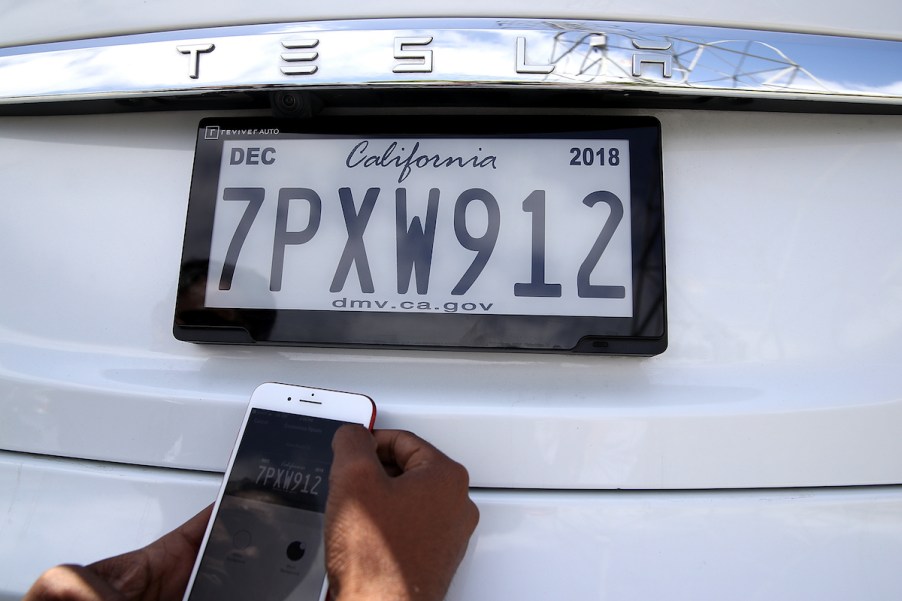
Digital License Plates: Which States Have Them?
U.S. laws require all cars to have license plates so that police can identify vehicles if necessary. Plates don’t not only make it easier for officers to issue citations. But if your vehicle is stolen, the authorities can track down your car more easily if it has the proper plates. And now (or soon), you might have the option to display a digital license plate on your vehicle instead of a traditional metal one. Here’s more about digital license plates and which states have them.
You can apply for digital license plates in these states

Everyone licensed to drive in California can receive a digital license plate. The company Reviver is responsible for providing these plates (branded “RPlates”) in the Golden State, Michigan, and Arizona. They’re also legal in Texas, though only for commercial fleet usage.
The company confirms that 10 other states will adopt digital license plates soon, though it hasn’t named those states yet.
Additionally, “you can legally drive your RPlate (attached to your car, of course) to any U.S. state, as well as Canada and Mexico,” Reviver says. It also supports disability plates.
You can purchase a digital license subscription through the Reviver website, with the option to choose between battery-powered or wired plates. The latter is wired to your car’s electrical system, so it illuminates whenever your vehicle is running.
The battery-powered plates are the cheaper option, starting at $19.95 per month. If you purchase wired plates, they cost $24.95 per month with a two-year agreement. Yearly subscriptions cost $215.40 and $275.40, respectively. Professional installation costs $150, but Reviver gives instructions for installing the units yourself.
How do digital license plates work?
California lawmakers believe digital license plates will be more convenient than standard ones for most drivers. Instead of waiting at the DMV to renew, customers with digital plates can do so automatically. Users can also program the plates to pay for tolls and parking.
The RPlate technology includes a smartphone app, which you can use to customize the plates with various banners. These digital license plates also come with light and dark modes, making them more visible than metal ones.
According to dot.LA, each plate also offers 5G connectivity and Bluetooth. In addition, digital license plates promise to give drivers more protection against auto theft.
The RPlate app offers an option to notify law enforcement if your car has been taken. After that, the plate will display ‘STOLEN’ on the screen for any surrounding motorists to see. Each plate also has a GPS tracker.
To be on the safe side, keep your old metal license plate in your vehicle’s trunk. “In the unlikely event that your RPlate is not readable, you should replace your RPlate with the metal plate until the RPlate can be fixed or replaced,” the company says.
Possible privacy issues regarding these high-tech plates
Though digital license plates can be convenient if used properly, hackers can exploit them. dot.LA says one digital rights group has already stressed the dangers of storing all that sensitive data.
For example, GPS tracking would show drivers traveling to appointments at healthcare facilities or private events. Stalkers could also use the information to track their potential victims’ movements.
However, according to a study highlighted by NPR, these scenarios might be unrealistic. This report shows that neither drivers nor law enforcement officials saw the plates as significant safety concerns.
Furthermore, Reviver has precautions in place to protect users’ privacy. For example, you can turn the GPS tracking on or off at any time. RPlate also uses an encrypted cloud to contain all the data associated with the digital license plates.
For the time being, it seems Reviver has developed an innovative and secure alternative to traditional license plates. The only downside we can see is the added expense: It costs only about $60 a year to renew metal plates.


